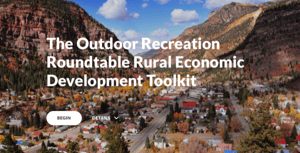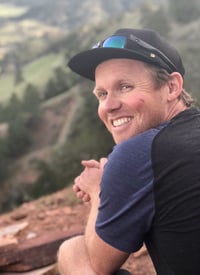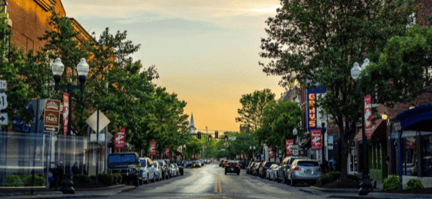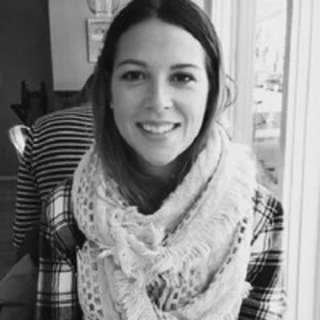A Conversation with Chris Perkins and Cailin O'Brien-Feeney
 Last year, we partnered with Outdoor Recreation Roundtable (ORR) to produce a Rural Development Toolkit to help rural communities build a recreation economy that supports local aspirations.
Last year, we partnered with Outdoor Recreation Roundtable (ORR) to produce a Rural Development Toolkit to help rural communities build a recreation economy that supports local aspirations.
To dig a little more deeply into both the new toolkit in the context of Oregon’s rural communities, we recently sat down with ORR’s researcher, Chris Perkins, who is also a joint degree student at Yale School of Environment and the School of Management, and Cailin O'Brien-Feeney, director of Oregon’s Office of Outdoor Recreation (OREC).Here’s what we talked about.
Meredith Morrice: Chris, what inspired you to create this toolkit?
Chis Perkins: There is a serious problem with communities having to reinvent the wheel when it comes to planning for economic development. That’s what the toolkit is really trying to help with. Our goal is to give communities enough to get started, so that they’ll be well equipped to get help when they need it.
.jpeg?width=200&name=B13B5817-C230-48A4-ACC2-F6F2BE20A0C9_1_201_a(1).jpeg) Rachel Schmidt, the former state director for Montana, really put a fine point on it for us. She said: “I wish I had a resource that would get communities to step six or seven in the process, rather than coming to my office at step one.” She told me that would dramatically increase her bandwidth. That was a light bulb moment for me like, can ORR put together some best practices that are very actionable, readable for a diverse array of communities across the United States?
Rachel Schmidt, the former state director for Montana, really put a fine point on it for us. She said: “I wish I had a resource that would get communities to step six or seven in the process, rather than coming to my office at step one.” She told me that would dramatically increase her bandwidth. That was a light bulb moment for me like, can ORR put together some best practices that are very actionable, readable for a diverse array of communities across the United States?
Then there's this new program at the EPA called Recreation Economy for Rural Communities. The idea is that EPA will provide technical assistance for rural communities to build around outdoor recreation. They had enough funding for 10 grants this year, and 170 communities applied. Think about that: 17 communities competed for each open grant!
There's this massive demand for development around outdoor recreation in rural America, and the Outdoor Recreation Roundtable really wants to meet that need. For us, the best way to support all of the outdoor associations that make up our membership is to support vibrant, community-led economic development efforts.
Over the summer of 2020, I reached out to folks like Cailin and other state directors of outdoor recreation, as well as federal agencies, economic development groups, local nonprofits. I asked them: What have you observed about the development of these economies? What should other communities know?
What came out of that was a set of 15 best practices in a toolkit form. We put together a webinar that had over 700 attendees, which is indicative of the demand that's out there right now. And hopefully, this toolkit is one piece of the puzzle to supporting economic growth and communities across the United States.
[Note: The Toolkit Webinar is available on YouTube.]
Meredith: That’s pretty impressive, especially right now when we're all so Zoom fatigued!
Cailin, before we jump into a discussion of what you’re seeing on the ground in Oregon communities, can you describe your role and the role of the Office of Outdoor Recreation?
Cailin O'Brien-Feeney: OREC is one of 18 state offices of outdoor recreation across the country. We’re each a little different, but we all have a mission of elevating the benefits of outdoor recreation to people, communities and  economies. In addition, Oregon is a signatory of the Confluence Accords, which is a set of guiding principles for advancing economic development, workforce development, conservation and stewardship, public health and wellness.
economies. In addition, Oregon is a signatory of the Confluence Accords, which is a set of guiding principles for advancing economic development, workforce development, conservation and stewardship, public health and wellness.
My role is to provide support at the community level and to build a network of outdoor recreation stakeholders, agencies and elected officials. I also advocate for funding and services to help communities realize their own outdoor recreation goals.
Meredith: What are you seeing in rural Oregon communities, in terms of both potential and interest for economic development through outdoor recreation?
Cailin: Let me start with a little bit of background. Outdoor Recreation already accounts for 6% of our state’s GDP and supports 224,000 full and part time jobs. By geography, most of Oregon is rural. It's a majority public land state, and in many communities, there’s either already an outdoor recreation economy in place or interest in creating one.
For example, in Willamette Valley I’m having conversations with a county commissioner about opportunities to increase and encourage private land access in a way that works for the private timber landowners, which would do a huge amount of good for their local outdoor recreation economy.
We've also been working with a couple of different business entities interested in opening up campgrounds. Right now, the demand for campgrounds significantly outstrips supply, even accounting for Oregon’s amazing state parks system. Done well, these privately owned campgrounds can be compatible with other elements of a rural economy such as timber, grazing and agriculture. It’s a way to incentivize private land conservation and support local economies.
Then there’s the work that stakeholders, states, tribes, and nonprofit groups have been doing for a long time related to the future dam removal on the Klamath River on the Oregon-California border.
So, there’s a lot to be excited about, but we still have some structural challenges in place.
First, there’s anxiety about the impact that tourism can have on local communities and infrastructure. Then there are challenges for some small communities that might not have a paid person in place to drive this process. Others get frustrated by funding opportunities, because they can’t meet the matching requirements for grants.
Finally, there’s the need to address the potential cultural shift that tourism can bring. People don't want to see a place they love change. They want economic opportunity, but they don’t want to lose the way of living they've enjoyed for multiple generations.
How you balance all those things is hard, it takes work, but it's doable. Being able to share out this toolkit as a starting point in those conversations has already been helpful.
Chris: That’s such an important point about culture. We dedicate a fair bit of space in the toolkit to that issue.
Think about Moab, Utah. As Emily Niehaus, the current Mayor of Moab said, “We want communities to zone for authenticity." Her idea was to address these challenges proactively rather than reactively so that the community has significant buy-in and reaps the benefits of the development, while holding onto the things that make the community unique. We hope the toolkit contributes to that as well.
Meredith: That reminds me of a couple of really interesting quotes in the toolkit around the question of where to start this work and who should start these conversations. The idea is that rural development needs to start at the grassroots level.
Cailin: Yes. That is essential.
I see my role as support, trying to connect to resources and bring people together as opposed to directing how something should happen. To be successful, the drive has to come from within the community, and someone has to have the vision and long-term capacity to keep it going. That's where having some sort of team, preferably with one or two people who are actually paid staff, really helps.
I really do believe that any community can do this work, though, and there’s actually a lot of support along the way. This toolkit is a huge step forward in showing communities how to get started.
Chris: The first “best practice” in the toolkit, and it has everything to do with what Cailin is describing, is identifying and empowering local champions. When these efforts are pushed by the state government, from outside, they're generally viewed with skepticism and suspicion, if communities can identify the people who have the passion and vision and support them, even financially, they can get this off the ground.
Meredith: These next few questions are for both of you: what’s most exciting to you about the potential for recreation economies in rural communities? If you were to look out 10 years in the future and imagine wild success, what is that? Chris, what does that look like for you at the national level? And Cailin, what does that look like for Oregon?
Chris: I think the outdoor recreation economy has a unique opportunity right now to diversify and build more sustainable, supported and resilient economies. The hope is that these economies attract talent and investment to build new businesses and support existing businesses, and that community members themselves get outside frequently and experience the physical and mental health benefits that come with time spent outside.
When I look ahead a few years, I hope to see a virtuous circle, where communities that enable their own people to spend more time outside see better quality of life and savings on things like public health expenses, even as the outdoor amenities they’ve created draw visitors —people who spend money in the community. You get thriving people and thriving businesses in communities that may have been struggling for generations. That’s really exciting to me.
Cailin: For me, success is that there’s no distinction or conflict between a healthy environment and a strong economy. Outdoor recreation as an economic driver doesn't displace other things, but is another very helpful, well supported tool in the toolbox.
We have a little ways to go to get policies and funding aligned with where people who live in the state already are in terms of values, and a big part of my job is to try to make that happen.
Then, if we’re talking about wild success, there are certain projects that I want to see happen. Whether it's the Joseph Branch trail out in our Wallowa county, or the Salmonberry Trail connecting the Portland metro to the coasts, or the Oregon Coast Trail that would go border to border along Oregon's entirely public coastline, or river access to a restored Klamath River. There are some big things on the horizon that Oregon has the opportunity to really get right to help support the communities where these projects are being planned. And in doing so, hopefully it inspires other action.
We also have an opportunity and an obligation right now to rethink how recreation is brought back into those areas affected by wildfire. We have an obligation, as Chris so eloquently put it, to support a more sustainable, equitable, local economy. I mean, it’s a lot to accomplish, but you asked about wild success.
I think we can get there.
Meredith: Chris, what's next for the toolkit? How are you envisioning this work growing?
Chris: What's next is that communities like the ones that Cailin works with, and communities around the country, hopefully put it to use. We really anticipate this being as a living, breathing document where we put it in the hands of communities, so it can support their strategies and development, and then get feedback or new success stories to cite and new funding resources to include.
We’re currently working on a feedback form, but in the meantime, they can email me at cperkins@recreationroundtable.org.
Meredith: What other support is needed right now?
Cailin: I see a couple of roles in the near future. There’s a need for specific skills training around the tools of economic development that relate specifically to the outdoor recreation economy, like the nuts and bolts stuff.
I’m also excited to continue partnering with the researchers at Oregon State to better understand recreation demographic trends and economic information, building on the health benefits survey work that we've done in the past. And all of that work, just like this toolkit, are necessary pieces to help support communities in achieving whatever goals they have.
Chris: Yeah, the need for research and support in this space is pretty much limitless, to be honest.
Meredith: Limitless. Sounds like we’ve all got our work cut out for us!




